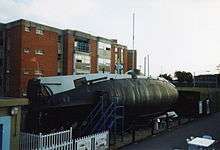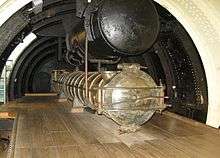HMS Holland 1
 Holland 1 under way | |
| History | |
|---|---|
| Name: | Holland 1 |
| Ordered: | 1900 |
| Builder: |
|
| Laid down: | 1900 |
| Launched: | 1901 Yacht Shed No 1 |
| Commissioned: | 1901 |
| Decommissioned: | 5 November 1913 |
| Fate: | Lost while under tow, subsequently raised and on display at Royal Navy Submarine Museum, Gosport |
| General characteristics | |
| Type: | Submarine |
| Displacement: | 105 long tons (107 t) submerged |
| Length: | 63 ft 10 in (19.46 m)[1] |
| Beam: | 11 ft 9 in (3.58 m)[1] |
| Propulsion: |
|
| Speed: | 7 knots (8.1 mph; 13 km/h) submerged |
| Range: | 20 nmi (37 km) at 7 kn (8.1 mph; 13 km/h) submerged |
| Test depth: | 100 ft (30 m) |
| Complement: | 8 (Lieutenant, Sub-Lieutenant, Coxswain, Torpedo Instructor, Chief Engineering Artificer, Leading Stoker, Stoker, Leading Seaman and Able Seaman) |
| Armament: |
|
Holland 1 (or HM submarine Torpedo Boat No 1) was the first submarine commissioned by the Royal Navy, the first in a six-boat batch of the Holland-class submarine. She was lost in 1913 while under tow to the scrapyard following decommissioning. Recovered in 1982, she was put on display at the Royal Navy Submarine Museum, Gosport.
History
In 1901 she was ordered from John Philip Holland and built at Barrow-in-Furness. The keel was laid down 4 February 1901.[1] In order to keep the boat’s construction secret, she was assembled in a building labelled "Yacht Shed", and the parts that had to be fabricated in the general yard were marked for "pontoon no 1".[2] She was launched on 2 October 1901 and dived for the first time (in an enclosed basin) on 20 March 1902.[3] Sea trials began in April 1902.[4]
In September 1902 she arrived at Portsmouth with the other completed Holland boat and along with HMS Hazard (their tender) made up the "First Submarine Flotilla", commanded by Captain Reginald Bacon.
On 3 March 1903 Holland 1 suffered an explosion that caused four injuries.[5]
On 24 October 1904, with the rest of the Holland fleet and three A-class boats, Holland 1 sailed from Portsmouth to attack a Russian fleet that had mistakenly sunk a number of British fishing vessels in the North Sea in the Dogger Bank incident. The boats were recalled before any attack could take place.[6]
The submarine was decommissioned and sold in 1913 to Thos W Ward for £410.[6] By the time the submarine was sold she was considered so obsolete that she was sold with all fittings intact, and the only requirement put on the purchaser was that the torpedo tube be put out of action.[6]
Loss

While being towed to the scrapyard Holland 1 encountered very severe weather and sank about a mile and a half off Eddystone lighthouse.[6] No one was on board the submarine at the time, and, since the submarine had been seen to be sinking earlier in the journey, the crew of the tug were ready to release the tow rope, preventing any damage to the tug.[6]
Recovery

The wreck was located in 1981 by Plymouth historian Michael Pearn and in November 1982 she was raised.[7] From 1983, after coating in anti-corrosion chemicals, she was displayed at the Royal Navy Submarine Museum. Work on restoring the submarine continued until September 1988.[8] A talking figure was included to explain the details of the craft to visitors.[8] However, by 1993 it was apparent that the treatment had proved inadequate. A fibreglass tank was built around her, and she was immersed in sodium carbonate solution from 1995. After four years the corrosive chloride ions had been removed, and she was able to be displayed again after restoration work.[9]
Listed as part of the National Historic Fleet, in 2001, on her centenary, a new purpose-built climate-controlled building was opened by Countess Mountbatten. In the same year the Royal Mail put a photo of the submarine on a 65 pence stamp.[10] In 2011 the submarine was given an Engineering Heritage Award by the Institution of Mechanical Engineers [11]
The original bank of batteries, recovered with the wreckage, were provided for testing to the original manufacturer, Chloride Industrial Batteries Ltd based in Swinton, Greater Manchester. Following the initial clean, the lead batteries were recharged and found to be in good working order. Some of the original batteries still remain in the possession of Enersys (ex-CIBL) at the Newport plant, in South Wales.

See also
Notes and references
- 1 2 3 Hutchinson, Robert (2001). Submarines War Beneath the Waves From 1776 to the present day. HarperCollinsPublishers. pp. 25–27. ISBN 0-00-765333-6.
- ↑ Compton-Hall, Richard (1983). Submarine boats The beginnings of underwater warfare. London: Conway maritime press. p. 117. ISBN 0-85177-288-9.
- ↑ Compton-Hall, Richard (1983). Submarine boats The beginnings of underwater warfare. London: Conway maritime press. p. 120. ISBN 0-85177-288-9.
- ↑ Compton-Hall, Richard (1983). Submarine boats The beginnings of underwater warfare. London: Conway maritime press. p. 115. ISBN 0-85177-288-9.
- ↑ Compton-Hall, Richard (1983). Submarine boats The beginnings of underwater warfare. London: Conway maritime press. p. 140. ISBN 0-85177-288-9.
- 1 2 3 4 5 Compton-Hall, Richard (1983). Submarine boats The beginnings of underwater warfare. London: Conway maritime press. p. 11. ISBN 0-85177-288-9.
- ↑ Dunmore, Spencer (2002). Lost Subs From the Hunley to the Kursk, the greatest submarines ever lost – and found. Madison press books. p. 44. ISBN 1-903985-48-X.
- 1 2 Tait, Simon (1989). Palaces of Discovery The Changing World of Britain's Museums. Quiller Press. pp. 130–132. ISBN 1870948009.
- ↑ "Holland I Conservation". Holland 1. The Royal Navy Submarine Museum. Retrieved 16 May 2014.
- ↑ Chamberlain, Zoe (6 April 2001). "Sailors give a stamp of approval". Mail (Birmingham). p. 14.
- ↑ "Holland One submarine given engineering award". BBC News. BBC. 4 May 2011. Retrieved 4 May 2011.
External links
| Wikimedia Commons has media related to HMS Holland 1. |
- Own page on RNSM website
- MaritimeQuest HMS Holland 1 Pages
- Early Holland Submarines Photos of John Holland's Submarine No. 1 and the Fenian Ram at the Paterson Museum